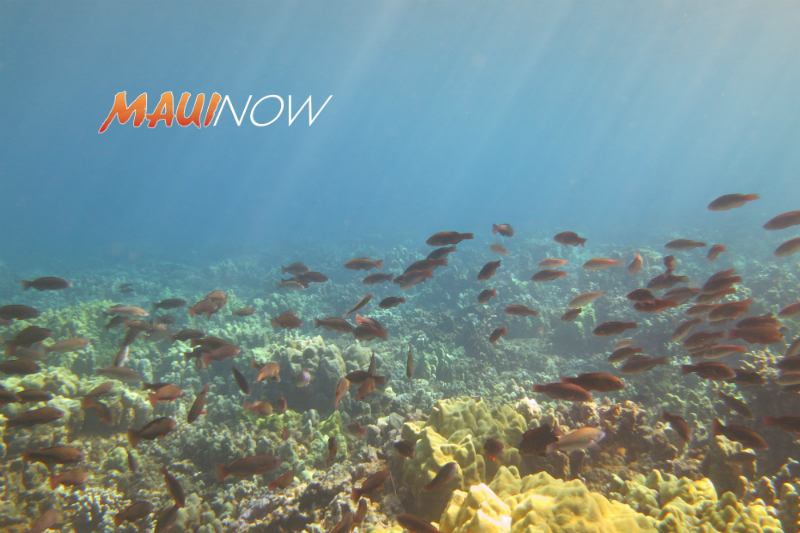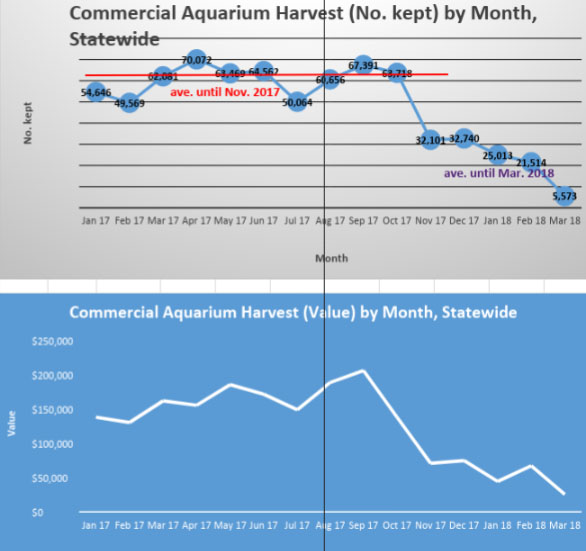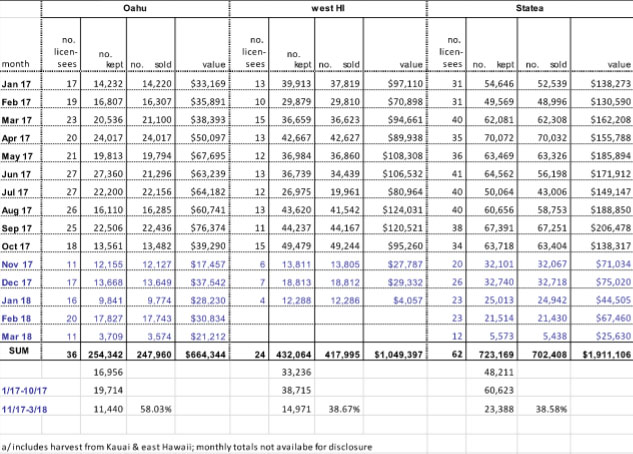Environmental Court Voids 131 Recreational Aquarium Collection Permits
More than 130 recreational aquarium collection permits are now void under a new ruling issued in Hawaiʻi’s Environmental Court on Thursday. The decision is the latest legal victory for the group who sued the state Department of Land and Natural Resources in 2012 for allegedly failing to comply with Hawaiʻi’s Environmental Policy Act and study environmental impacts before issuing aquarium collection permits.

A school of juvenile parrotfishes, protected within the Kahekili Herbivore Fisheries Management Area, swims over the reef in spring of 2014, an optimistic sign signaling early stages of this reef’s recovery. Credit: Liz Foote
The Center for Biological Diversity joined Maui resident Rene Umberger, The Conservation Council for Hawaiʻi and The Humane Society of the United States, as well as Mike Nakachi, and Ka‘imi and Willie Kaupiko in filing the lawsuit. All plaintiffs were represented by the environmental law firm Earthjustice.
According to the conservation groups, the ruling invalidates the existing permits, each of which had authorized the capture of nearly 2,000 fish. That translates to the capture of 250,000 fish in a year, the groups said.
The groups claimed the permitting structure allowed for “unlimited take” since there is no law limiting the number of permits the department could issue. They also criticized the online process, which allowed for the issuance of a permit without requiring an applicant to describe what fish they intended to catch, how many or where.
“These permits are invalid because DLNR issued them without considering the environmental consequences as Hawaiʻi law requires, without even asking what each applicant intended to do with a permit,” said Earthjustice attorney Summer Kupau-Odo, who represents plaintiffs in the lawsuit. “DLNR’s duty is to manage and conserve, not be cavalier about, Hawaiʻi’s public trust resources.”
“This victory is an important step toward protecting Hawaiʻi’s beleaguered reef fish from the aquarium industry,” said Miyoko Sakashita, ocean program director at the Center for Biological Diversity. “State officials can’t continue giving aquarium collectors free rein to disrupt and destroy some of the world’s most beautiful coastal ecosystems.”
“The Hawaiʻi Supreme Court set a strong precedent in its ruling last year that DLNR cannot ignore the devastating impacts of unlimited commercial fish collection on Hawaiʻi’s delicate coral reefs,” said Anna Frostic, managing wildlife attorney for The Humane Society of the United States. “Thursday’s ruling properly follows that opinion, and recognizes that DLNR similarly cannot allow the removal of hundreds of thousands of fish under recreational permits in the absence of environmental review.”
DLNR Responds:

Hawaiʻi DLNR.
DLNR Division of Aquatics administrator Dr. Bruce Anderson responded to Maui Now’s request for comment saying:
“The aquarium fish industry is pursuing the environmental review as ‘an applicant action’ whereby the
permittees (aquarium fish collectors who need permits to use fine mesh nets or traps) are developing
the necessary documents, the Environmental Assessment to comply with Chapter 343 of the
Hawaiʻi Revised Statutes. DLNR has submitted these documents to OEQC for dissemination and public comment as required, but the responsibility is on the applicants to develop these draft documents, to respond to comments, and to prepare the final documents. If significant impacts are identified in the EA, then an Environmental Impact Statement will be necessary as required in Chapter 343.
“The applicants (aquarium fish collectors) have prepared two separate EAs; one for the fishery on the aquarium fishery on Big Island and another for the aquarium fishery on Oahu. The reason these are separate documents is that the fisheries differ on Oʻahu and the Big Island both in the species that are collected, their numbers, and the manner in which they are collected. There is no significant aquarium fish collection on Kauai, Molokaʻi, Maui, or Lānaʻi at this time.

Hawaiʻi DLNR. Click to view in greater detail.
“The actions DAR/DLNR have taken are in response to the Supreme Court ruling in September 6, 2017, and the Circuit Court decision in October 27, 2017. To recap, DAR/DLNR will not allow the use of fine-mesh nets until the Chapter 343 (Environmental Review) process has been completed. We immediately ceased issuing new permits and voided any existing permits to use fine mesh nets when that ruling was reached. Subsequently, we went further in West Hawaiʻi because the West Hawaiʻi Aquarium rules require both a West Hawaii Aquarium permit and a permit to use a small mesh net to
collect aquarium life. Consequently, all aquarium fish collection in West Hawaii have been discontinued.
“The DAR website has a list of Frequently Asked Questions on the subject. This site includes a lot more information on how we are handling aquarium permits and enforcement.
“Plaintiffs in the Supreme Court case do not want any fish or other aquatic life taken for aquarium purposes anywhere by any means. We (DAR/DLNR) have done what was required by the Court in a timely manner. Indeed, we have resolved uncertainties in favor of what we believe is the intent of the Supreme Court (i.e., shut down the West Hawaiʻi aquarium industry altogether). To go further, would subject us to possible lawsuits for an overly broad interpretation of the court order. No further actions are anticipated until the environmental review process has been completed.
“With regard to the catch report statistics that this reporter claims receiving from DLNR, aquarium take
has dropped significantly since the court order banning the use of fine mesh nets. Attached is the
updated January 2017 through March 2018 commercial aquarium catch report summaries for
the State, Oʻahu and west Hawaiʻi. Monthly summaries for Kauaʻi and east Hawaiʻi are not available for
disclosure due to data confidentiality.
“The Commercial Aquarium Permit was declared invalid by the Circuit Court on October 27, 2017. The monthly average take for the State from January 2017 through October 2017 is 60,623. The monthly average take from November 2017 through March 2018 is 23,388, which is a 38.6% reduction.
“For Oʻahu, the monthly average take from January 2017 through October 2017 is 19,714. The monthly average take from November 2017 through March 2018 is 11,440, which is a 58.0% reduction. The Oʻahu aquarium fishery is comprised of finfish and invertebrate collections. During December 2017 and February 2018, the majority of the collection involved invertebrates. Generally, collectors do not use fine mesh net to collect invertebrates such as hermit crabs and feather dusters. Again, it should be appreciated that the take of invertebrates and fish (without the use of fine mesh nets) everywhere but West Hawaiʻi is still allowed.
“For west Hawaiʻi, the monthly average take from January 2017 through October 2017 is 38,715. The monthly average take from November 2017 through March 2017 is 14,971, which is a 38.7% reduction. Most of the collection during this period is attributed to invertebrates such as ʻōpae ʻula, which can be collected without the use of fine mesh net outside of the WHIFMA. During the first week of January 2018, DLNR broadcast an updated FAQ to the commercial collectors on west Hawaiʻi to remind them that the aquarium collecting practice must cease. There were no reported harvests from west Hawaiʻi collectors since February 2018.”










